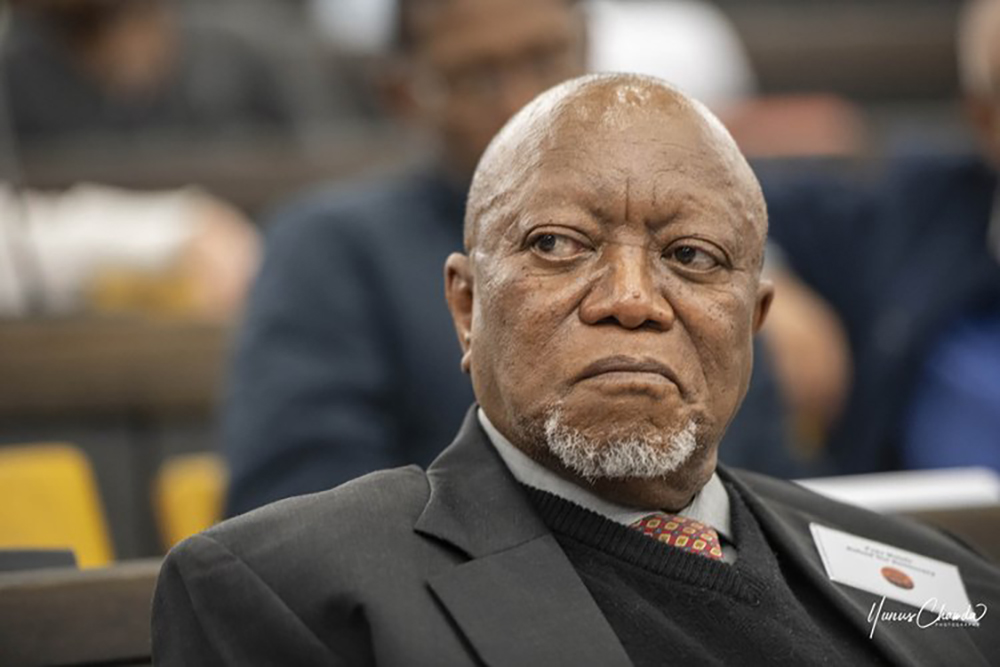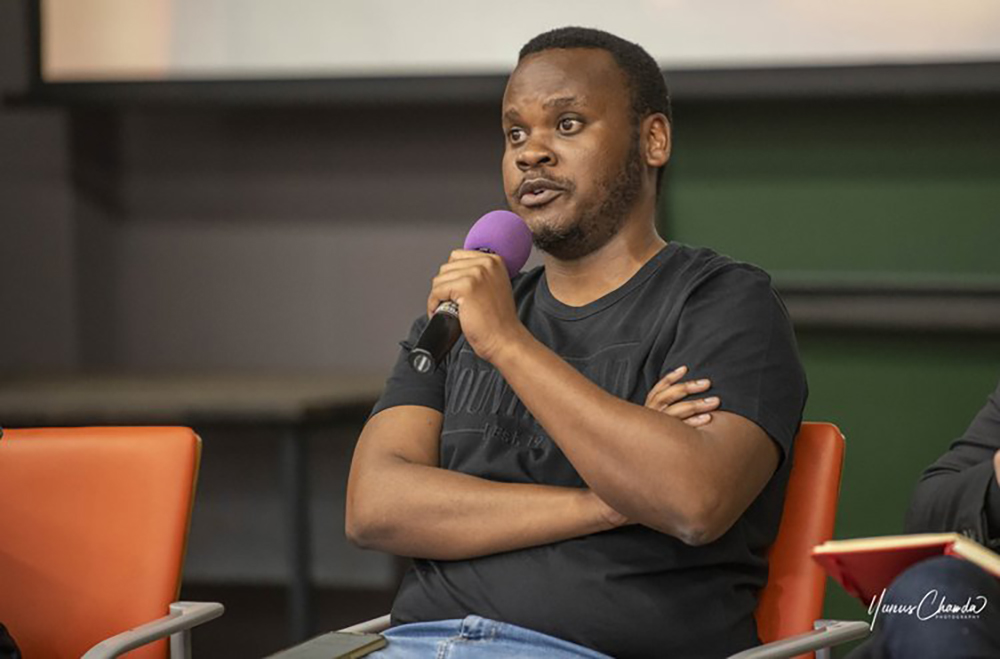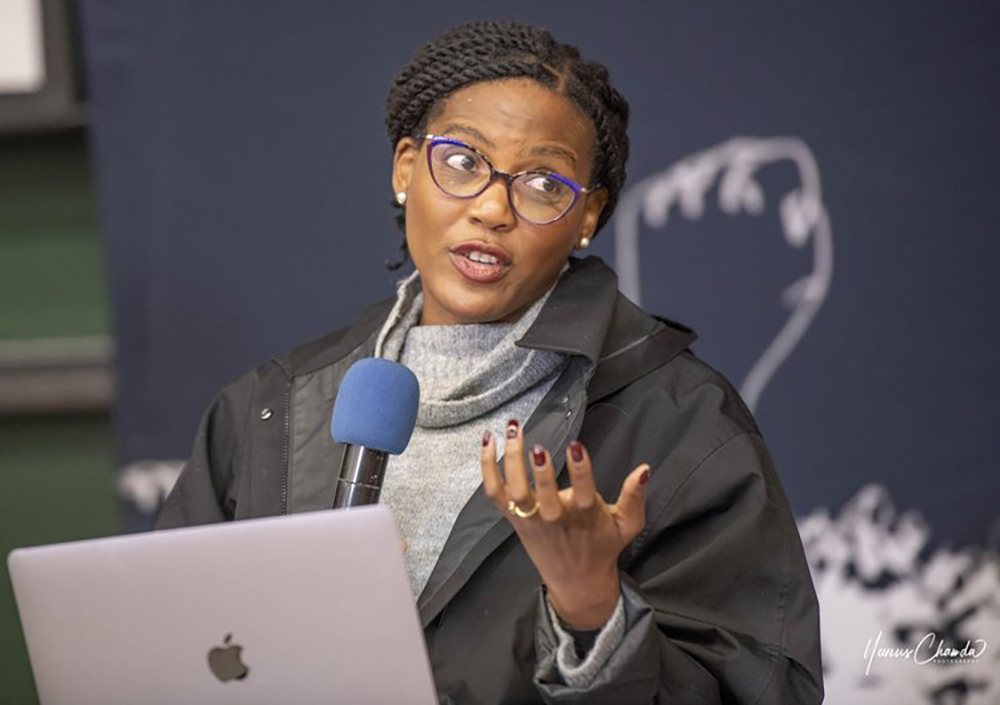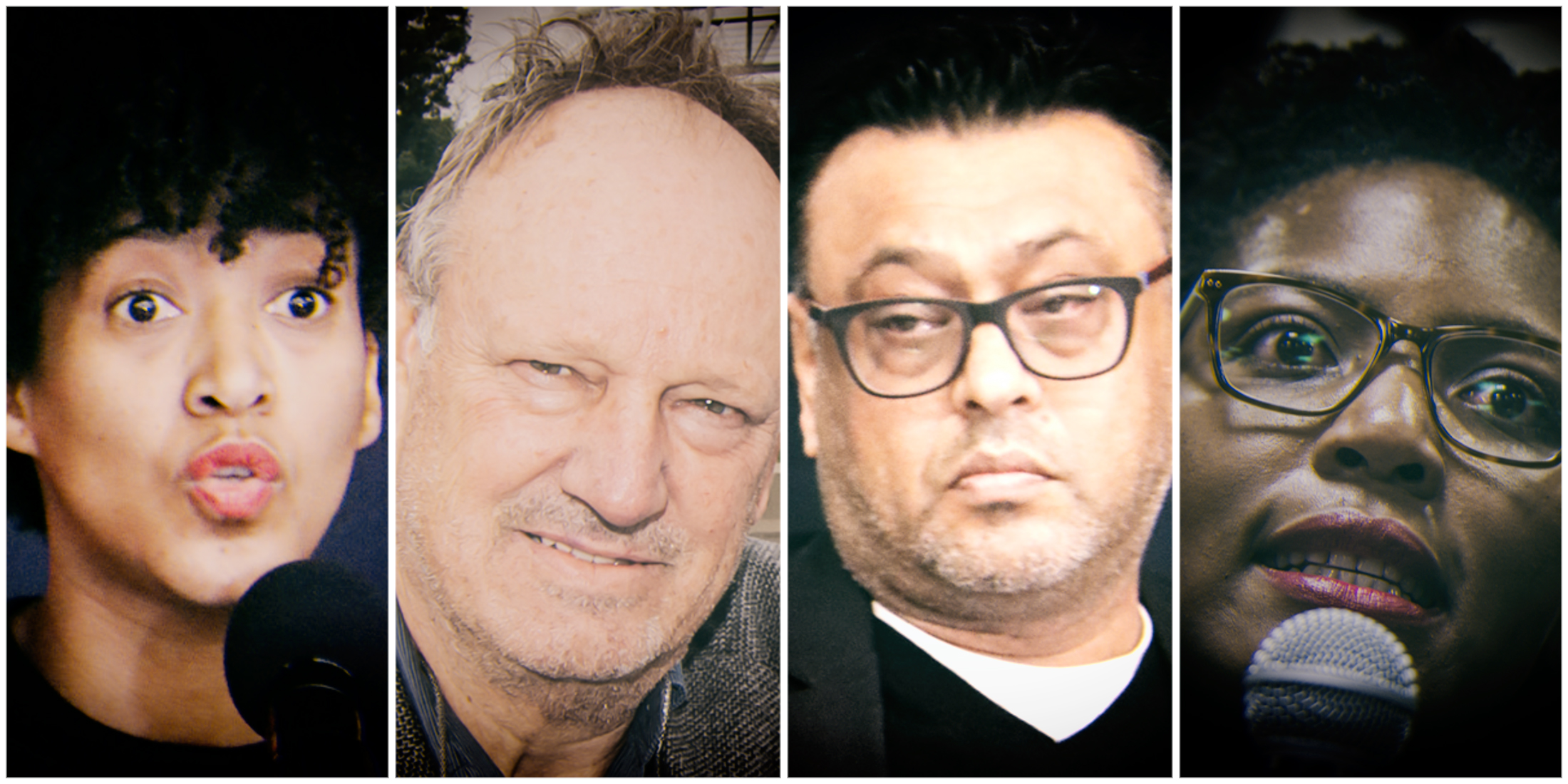“We cannot, as civil society, continue to stand by and be observers or spectators towards the drama that is unfolding.”
These were the opening words of Rosalie Manning, the chair for the Remuneration and Social and Ethics Committees at Fraser Alexander.
Manning was speaking at the official launch of the Defend Our Democracy movement (DOD). The launch took place on Saturday, 27 May at the Gordon Institute for Business Science: Business School in Johannesburg and included keynote addresses from Popo Molefe and Tessa Dooms, a panel discussion on responses to a threat to democracy, a presentation of a draft constitution and an elective process.
The launch was attended by individuals in their personal capacity, and also from various organisations including Auwal Socio-Economic Research Institute, The Helen Suzman Foundation, Extinction Rebellion South Africa, and The Mapungubwe Institute for Strategic Reflection.
https://twitter.com/ForDemocracySa/status/1662416659380928512
Ensuring democracy not derailed
Dr Popo Simon Molefe, executive chairman of Lereko Investments, gave a keynote address.
“This conference takes place in the context of the 40th anniversary of the United Democratic Front (UDF) — an organisation or a front about which we still have a deep sense of nostalgia,” he said.
To celebrate the anniversary, former UDF members and affiliates will be launching an initiative called UDF 40. “As was the case in 1983, we all have a vital mission, which is of critical importance to our country and our democracy,” he said. “Put simply, we have to ensure our democracy is not derailed.”
“That is our mission, and as we do so, we must ensure that the history and legacy of the UDF is not just remembered, but that we draw lessons from its vision, values, ethos, ideals and modus operandi, and use them to inform the collective effort to defend, deepen and strengthen South African democracy,” he said.
 Dr Popo Molefe gave a keynote address at the launch. (Photo: Supplied)
Dr Popo Molefe gave a keynote address at the launch. (Photo: Supplied)
Active citizenry for democracy
The theme of the project [UDF 40] is active citizenry for transformation and accountability. Active citizenry is critical for the sustenance and strengthening of South Africa’s democracy. “It also means that many South Africans will have to get off their passive armchairs, social media activism and be prepared to work actively to bring about change,” he said.
Molefe noted concerns that older leaders do not adequately respond to the youth, which leads to either political apathy or political delinquency, and spills into the government and wider society.
Younger generations have no agency
There are serious problems with many young people having no agency and not being able to respond to their generational mission. “I have no hesitation in stating that we must unite young and old activists in meaningful ways if we are truly to bring about change,” he said.
Molefe concluded by saying that the priority should be a well-planned and coherent reintroduction of progressive policy experts into the public and media space. “In this way, I think progressive voices can reclaim the public policy space and so regain moral, value-led, intellectual and principled leadership in society,” he said. “This would activate hope, activism, and confidence that the dire state of the nation can be turned around.”
Tessa Dooms, director of the Rivonia Circle, also provided a keynote address about the local and global threats to democracy. Dooms said that earlier this year, she travelled to the UK and spoke with civil society activists from various countries about some of the challenges they are facing and the stage of democracy. “The one thing that stood out for me in the various conversations was the theme that says we don’t have a political or governance crisis only, but that democracy is in crisis,” she said.
 Rekgotsofetse Chikane, a lecturer at Wits School of Governance, was a panellist and spoke about movement building and civic activism. (Photo: Supplied)
Rekgotsofetse Chikane, a lecturer at Wits School of Governance, was a panellist and spoke about movement building and civic activism. (Photo: Supplied)
Democracy in crisis
Spending the upcoming months before the 2024 election talking about democracy may be a fruitless exercise, as many people are disillusioned with democracy. “What I am asking for is not a defence of democracy, but an interrogation of democracy and an innovation of democracy. We must build a democracy that works for the majority of people in this country or it will fail,” she said.
Dooms recalled that last year, Rivonia Circle held a Democracy Builder in Umlazi but could not start the democracy builder as there was a protest outside. “There was a protest of 16- and 17-year-olds outside Wentworth High, protesting because the day before a 15-year-old had stabbed another 15-year-old over a drug deal,” she said. The activists in the community were saying that since the protest was about drugs, it had nothing to do with democracy, something she disagreed with. “I said to my team we are not going to have a cute conversation about democracy while young people are outside protesting for their very lives,” she said.
“We in civil society have gotten democracy so that’s why we can defend it, but the majority of citizens have not gotten any fruits of this democracy, including a voice”.
Four takeaways
Dooms had four key points she wanted to discuss. She urged people to agree that the time for resistance politics is over. “You cannot shame shameless people into acting properly. You cannot resist a thing that is falling apart,” she said.
People need to reclaim agency. “All people of this country, not only those of us who get to be in elite spaces because we already have power,” she said. Civil society should also give back power and agency to communities. “Until we [civil society] are ready to give over power to the people of this country bona fide, we will continue to have them in the clutches of people who have bad intentions and even poorer politics because they at least want to go and listen,” she said.
Treating young people as equals when they are in the room is no longer sufficient. “We must take a principled stance to be led by the young people of this country. We must all be willing to be led by 21-year-olds, 25-year-olds, 30-year-olds, 35-year-olds,” she said. “If they could lead themselves in ‘fees must fall’ and lead themselves in keeping communities going every day, why do we think they can’t lead us?” she asked.
Conversations should be realigned
Conversations and conversation partners should be realigned. “Our conversations must no longer be about the past, they must be about the future,” she said. Conversations with people that we fundamentally disagree with should also be had. “We have to convince people with bad ideas to have good ideas, rather than turning our noses at them because they don’t share our ideas,” she said.
In the lead-up to the 2024 elections, civil society should play an active role in getting the country ready to choose its future government. “We must be on the side of citizens, on the side of voters, and we must give people the ability to talk through their political choices,” she said. “This thing about ‘we are not talking about voting and the quality of our options’ must stop. The 2024 elections must be a group project and we must all play our part and have conversations about it,” she said.
Dooms concluded by asking people to think seriously about how we innovate democracy, rather than defend it.
 Dr Sithembile Mbete, a political scientist, was part of a panel discussion on responses to threats to democracy. (Photo: Supplied)
Dr Sithembile Mbete, a political scientist, was part of a panel discussion on responses to threats to democracy. (Photo: Supplied)
Panel on threats
The launch included a panel discussion on responses to threats to democracy, facilitated by Thandie Orleyn.
Dr Sithembile Mbete, a political scientist, spoke about responses to threats to democracy through electoral and political reform. Mbete mentioned The Electoral Amendment Act that was signed into law by President Cyril Ramaphosa in April. “It was fundamentally about what should the relationship be between the electorate and the people they elect, and that is often missed in many of the conversations surrounding the case,” she said.
The New Nation Movement brought the case to court based on the sense that elected representatives are not accountable to the electorate, rather accountable far more to their political parties than to citizens, she said. “The reason why they are more accountable to parties than to citizens is because of our closed list proportional representation system, which gives free rein to political parties to decide who their representatives will be, and means a politician must play nice with the leadership of their party if they want to represent the country in a legislature,” she said.
The idea that there is insufficient accountability of representatives to the people that vote for them is a running theme in South African democracy. One of the best ways for this issue to be addressed is to have some kind of constituency-based system that would allow for direct election. “Electoral reform alone is not enough but it is a significant first step,” she said. “Civil society needs to put the discussion of electoral reform front and centre,” she said.
Holding parliamentarians to account
Mbete said that voters vote for Parliament and they don’t vote for the President and neither do they vote for the judiciary. “And yet, we as civil society have acted as if you can run this country with the Presidency and the Judiciary and we completely ignore parliament,” she said. “In South Africa, people vote for parliamentarians, but ignore those parliamentarians and fail to hold them accountable for the power they hold. Democratic sovereignty in this country is vested in Parliament,” she said.
Part of reinvigorating our democracy is taking parliament seriously and in that forcing parliamentarians to take themselves seriously. Another part of reinvigorating democracy is figuring out how to make the state work. “Active citizenry is important but it doesn’t matter how active your citizenry is if your state does not have the capacity to respond,” she said. Mbete pointed to the Cholera outbreak in Hammanskraal and how there is no shortage of active citizenry there, but people are still dying. “Because that state has continuously over twenty years been unable to get itself together to fix the issues at the Rooiwal water treatment plant,” she said.
Changes to make SA successful
Mbete said the answer to what political changes to make South Africa successful can’t be answered by the people in this room. “Our voter's roll is getting old and aging out. If we continue at this rate, you will have fewer and fewer people voting or being able to vote and that will affect the legitimacy of our democracy,” she said.
Wayne Duvenge, chairperson of Organisation Undoing Tax Abuse (OUTA), spoke about threats to democracy through anti-corruption anti-state capture work.
The irrationality evident in government comes from only two things; ineptitude or corruption. “Ineptitude in this country today is a form of corruption. Where political players put people into positions of administration, who are not equipped to lead those roles and positions, to be manipulated by their political masters for corrupt agendas,” he said.
An irrational decision
The State of Disaster around electricity was an irrational decision that had to be challenged in court. “It was going to open the doors to the gross abuse of power,” he said.
The only explanation for the Karpowership deal is corruption. “Our responses to this corruption as civil society is to use every mechanism we can, and the courts are the one mechanism that we have had to turn to get transparency and slow governments’ irrational processes down,” he said.
Duvenge concluded by saying that 2024 is a turning point for South Africa. “It is our new democracy, we are fighting again to bring back a new way to seeing how does democracy work for its people,” he said.
Political destabilisation
Ebrahim Fakir, a political analyst, spoke about the threat to democracy through understanding and responding to political destabilisation. Fakir said fundamental overhaul is needed, even of the new electoral system that has been mooted for 2024. “We have to stop thinking about outcomes and think about inputs in how we design our systems,” he said.
There are also external threats to democracy. “We don’t want external actors to be involved in changing our regime, we are perfectly capable of doing this on our own,” he said.
The private sector has also been a source of destabilisation and has been a source of deepening inequalities. “The way in which the private sector has behaved in this country, with its short-termist, opportunist and myopic approach, has been a source of destabilisation in the country,” he said.
Using DOD for good
Rekgotsofetse Chikane, a lecturer in public policy at the Wits School of Governance, spoke about responses to threats to democracy through movement building and civic activism. Chikane described DOD as a “blue-chip civil society”. “It is powerful, you don’t see this anywhere else, and there is something to be said about how you leverage this type of space,” he said.
The emergence of DOD has managed to fill a vacuum of well-organised, well-resourced, and well-funded organisations coming together. “There is also a threat to that, that as you aggregate yourself you then leave other civil society behind,” he said.
Draft constitution and resolutions
The launch also included an overview of the work done by DOD to date, a presentation of the draft constitution of DOD, and an overview of its key resolutions.
The draft constitution states that DOD would be made up of a diverse range of South African civil society groups, organised labour and business, faith-based and community organisations, sectoral networks, academia and the media. “We want to present a platform with overarching values and politics for civic activism, solidarity, and change,” said Zaakirah Vadi, Defend Our Democracy’s coordinator.
Vadi said DOD would adopt a five-pillar programme of action for the next two years to build a popular movement for change. The resolutions are: electoral and political reform, tackling state capture and corruption, countering political destabilisation, democratic innovation linked to improving the quality of democracy, and movement building.
Elective process
Terry Tselane, Executive Chairman of the Institute of Election Management Services in Africa, oversaw the elective process for the leadership core of the Defend Our Democracy movement.
The results were as follows:
Chairperson: Moss Ntlha
Two deputy chairpersons: Neeshan Balton and Rekgotsofetse Chikane.
General Secretary: Kristen Abrahams.
Deputy Secretary: Communications: Kathy Berman.
Deputy Secretary: Finance and Fundraising: Dr Fazel Randera.
Three additional members of the board: Cynthia Stimpel, Malik Dasoo and Nicole Fritz.
The launch was concluded by Nonkululeko Mntambo, communicators officer for Defend Our Democracy, reading the declaration. “Now is the time to take back our democracy. We must make our constitutional democracy meaningful,” she said. “Defend Our Democracy believes that we must shape our own destiny. We no longer can rely on political parties to do so.
“We have the power to change our living conditions and the civil society movement we are launching today must play an indispensable role in the development of our country and in defence of our democracy.” DM




 Dr Sithembile Mbete, a political scientist, was part of a panel discussion on responses to threats to democracy (Photo: Supplied)
Dr Sithembile Mbete, a political scientist, was part of a panel discussion on responses to threats to democracy (Photo: Supplied) 